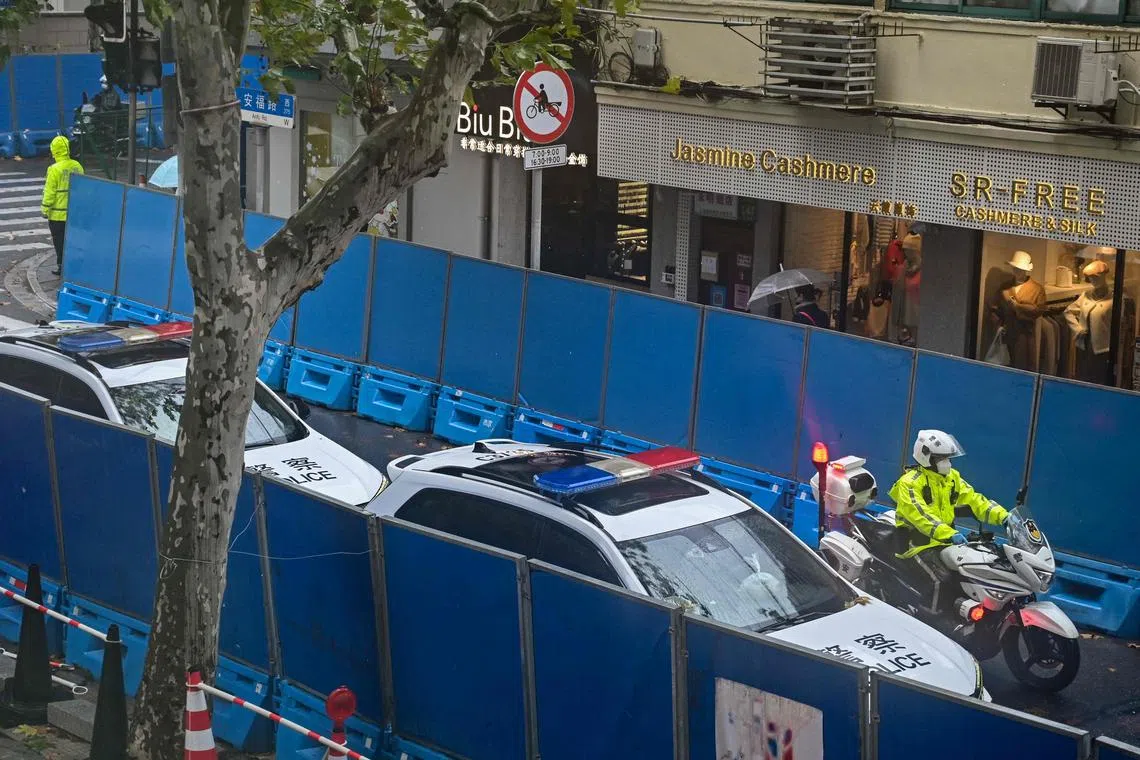China still clamping down on protest activities against Covid-19 lockdown
Sign up now: Get insights on Asia's fast-moving developments

Police vehicles are seen next to Wulumuqi road in Shanghai on Nov 29, 2022.
PHOTO: AFP
BEIJING - The Chinese authorities continue to clamp down on anti-lockdown protest activities
In Shanghai, where a massive crowd gathered on Wulumuqi Road on Saturday and Sunday, police have set up blue barriers preventing people from congregating.
Social media videos show police officers in a subway train checking commuters’ phones for banned apps such as Telegram and Signal, both secure messaging platforms.
Beijing has also had a heavier police presence than usual. By the Liangma River, where a protest was held on Sunday
The police have also been questioning protesters – whether over the phone or appearing at their homes – sending a chilling effect through the community, many who cannot ascertain for sure how they have been tracked down .
Some have deleted apps on their phones, including those allowing access to virtual private networks to access sites banned in China such as Telegram, Instagram and even WhatsApp.
“I just need a few days’ break before I can think of anything more,” one protester told The Straits Times via a social media app. She declined to be identified for fear of further reprisal.
The recent graduate said she had received a phone call from her local police station asking about her involvement in Sunday’s Beijing protest. She is now reconsidering taking part in future activities.
The Cyberspace Administration of China (CAC) has also issued guidelines on “cleanup” efforts, targeting protest organisers and censorship circumvention tools, and has told media outlets to watch out for red letter days.
These include Dec 9, which is International Anti-Corruption Day, and Dec 10, which marks International Human Rights Day, said the CAC circular that was first reported by China Digital Times, a website that reports on China’s Internet.
“Pay careful attention to these and other sensitive dates, maintain strict controls, and strengthen preliminary content audits. Promptly identify and report content aimed at stirring up public sentiment or any such similarly ‘targeted’ content,” it added.
Telegram groups where people have been sharing details about protests and vigils, along with promotional material, have also been targeted, with some suspended for having shared “pornographic content”.
On video-sharing sites, bullet comments – chatter that runs across videos in real time – have been suspended.
Social media platforms and news outlets have also banned commenting on any article relating to the death of former president Jiang Zemin
“Have a good journey, thank you for allowing everyone to watch Titanic all those years ago,” read a popular post on Weibo, a reference to a more open era when foreign films were regularly screened in Chinese cinemas.
Commenting and sharing were quickly disabled on the post, which was later made unsearchable.



